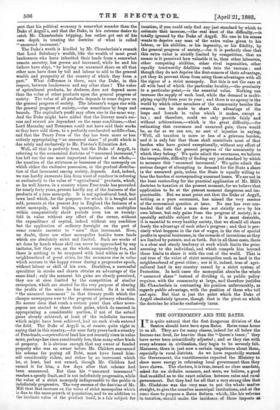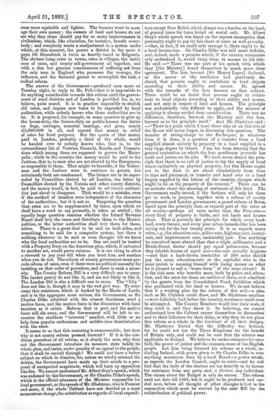THE GOVERNMENT AND THE RATES.
IT is quite natural that the first dangerous division of the Session should have been upon Rates. Rates come home to us all. They are for many classes, indeed for all below the Income-tax level, far heavier than the "Queen's taxes ;" they have never been scientifically adjusted ; and as they rise with every advance in civilisation, they begin to be severely felt. Moreover, there is just now a certain impatience about them, especially in rural• districts. As we have repeatedly warned the Government, the constituencies expected the Ministry to show more energy in reforming local government than they have shown. The electors, it is true, issued no clear, mandate, asked for ne definite measure, and were, we believe, a good deal muddled as to the exact relation between rates and rural government. But they had for all that a very strong idea that Mr. Gladstone was the very man to put the whole matter straight, to give the counties municipal institutions, and at the same time to propose a Rates Reform which, like his reforms in taxation, should make the incidence of those imposts at once more equitable and lighter. The farmers want to manage their own money ; the owners of land and houses do not see why they alone should pay for so many improvements in civilisation, which, like education, for instance, benefit everybody ; and everybody wants a readjustment in a system under which, at this moment, the poorer a district is, the more it pays, till Shoreditch is twice as heavily taxed as Belgravia. The electors lump rates in towns, rates in villages, the incidence of rates, and county self-government all together, and with a dim but genuine consciousness of suffering ask from the only man in England who possesses the courage, the influence, and the financial genius to accomplish the task, a radical reform.
The answer of the Government—produced once more on Tuesday night, in reply to Mr. Pell—that it is impossible to do anything considerable towards this reform until the government of rural districts and of London is provided for, is, we believe, quite sound. It is in practice impossible to abolish old rates, and impose new taxes to be expended by local authorities, while nobody knows who those authorities are to be. It is proposed, for example, in some quarters to give up the house-duty, the licence-duty on public-houses, the duties on dogs, carriages, armorial bearings, and guns, nearly £5,000,000 in all, and expend that money in relief of rates for local purposes. But the quota of that money paid in London, probably a third of the whole, would be handed over to nobody knows who, that is, to the extraordinary list of Vestries, Councils, Boards, and Commissions which among them are supposed to govern the Metropolis ; while in the counties the money would be paid to the Justices, that is, to men who are not elected by the Ratepayers, or responsible to them. That might be bearable, if the Vestrymen and the Justices were to continue to govern, but notoriously both are condemned. The former are to be superseded by Councillors elected by all London, the latter by Councilors elected by the Unions and other county districts, and the money would, in fact, be paid to ad interim authorities just about to disappear. That would be a mistake, even if the method of taxation were independent of the character of the authorities ; but it is not so. Supposing the question that rates are to be supplemented by taxes, upon which we shall have a word to say presently, is taken as settled ; the equally large question remains whether the Inland Revenue Board shall levy the taxes and distribute them to the Municipalities, or the latter authorities shall levy them for themselves. There is a great deal to be said on both sides, and something to be said for a composite system, but there is nothing whatever to be said or even thought till we know who the local authorities are to be. One set could be trusted with a Property Duty on the American plan, which, if entrusted to another set, would prove ruinous. It is one thing to allow a steward to pay your bill when you trust him, and another when you do not. The reform of county government must precede reform of rates, even if there were no political necessity for insisting on that order of procedure, and there is such a necessity. The County Reform Bill is a very difficult one to carry. The landed gentry do not like it, and are not likely to like it. The London Bill is also a difficult one to carry. The " City " does not like it, though it may in the end give way. To overcome this resistance, which is backed by the House of Lords, and is in the aggregate most• serious, the Government, as Sir Charles Dilke admitted with the utmost frankness, need a motive force, and the motive force is the discontent with local taxation as it exists. Reform that in part, and the motive force will die away, and the Government will be left to encounter the stubborn " interests " assailed, with little or no help from popular enthusiasm and middle-class dissatisfaction with the rates.
It seems to us that this reasoning is unanswerable; but then why is not county reform pressed. forward ? If it is the condition precedent of all reform, as is clearly the case, why does not the Government introduce its measure, state boldly its whole plan, and insist, under penalty of an appeal to the people, that it shall be carried through? We could not have a better subject on which to dissolve, for, unless we wholly misread the debate, the Government have made up their minds to a proposal of unexpected magnitude, which will burn up opposition like fire. We cannot understand Mr.. Albert Grey's speech, which was endorsed by the Government, or Sir Charles Dilke's speech, which is the official utterance of the Minister responsible for local government, or the speech of Mr. Gladstone, who is Premier and more, if the whole Cabinet have not decided on a most momentous change, the substitution as regards all local expendi ture except Poor Relief, which always was a burden on the land, of general taxes for taxes levied on rental only. Mr. Albert Grey's whole speech was based on the express assumption that personalty ought to pay its fair share of rates as well as realty, —that, in fact, if we could only manage it, there ought to be a local income-tax. Sir Charles Dilke was still more definite, and, indeed, made a promise which, if the country ratepayers only understood it, would bring them in masses to his side. He said :—" There was one part of his speech with which they [the Ministry] found themselves in much more close agreement. The hon. baronet [Sir Massey Lopes] declared, as the mover of the resolution had previously de-. dared, that persons ought to contribute to local objects according to their ability and means. He agreed with the remarks of the hon. baronet on that subject. There could be no doubt that persons ought to contribute to local objects according to their ability and means, and not only in respect of land and houses. The principle was undoubtedly very difficult to apply, and the manner of applying it always needed deep consideration. There was no difference, therefore, between the Ministry and the hon. baronet as to the principle itself." And Mr. Gladstone said : —"There is a point which I trust those who sit on this side of the House will never forget, in discussing this question. The transfer of rating-charge to the Exchequer, in whatever form it is done, is a question of a transfer from a fund supplied almost entirely by property to a fund supplied in a very large degree by labour. I am far from denying that the general contention on which the hon. gentleman proceeds has truth and justice on its side. We have never denied the principle that there is no call of justice to lay the supply of local wants exclusively on physical property, but this House ought not in . the dark to set about clandestinely from time to time and piecemeal, to transfer and hand over to a fund largely supplied by the labour of the country, charges which ought to lie on the property of the country." There can be no mistake about the meaning of sentences of this kind. The Government really intend, if the factions will only let them get to work, to propose, together with a reform of county government and London government, a grand reform of Rates, based upon the principle that, as regards part of the rates at all events—perhaps all rates newer than the Poor-rateevery kind of property is liable, and not lands and houses alone. That is precisely the principle for which every landlord, every farmer, and every poor urban householder has been crying out for the last twenty years. It is as regards many
rates, e.g., the education-rate, police-rate, highway-rate, lunacyrate, and improvement rate, undeniably just. Can anything be conceived more absurd than that a triple millionaire and a Brook-Street doctor should pay equal police-rates, because they inhabit houses of equal size—the case actually happens —and that a hard-driven freeholder of 200 acres should pay the same education-rate as the capitalist who in the same parish is amusing himself with losing money on what he is pleased to call a "home farm " of the same extent f It is the rich man who benefits most, both by police and education, and the rates for them are neither of them, as is admitted by the grants from the Consolidated Fund, liabilities which was purchased with the land or houses. We do not believe that if a working plan for the reform of this evil—a plan such as Mr. Childers could draw, and Mr. Gladstone sanction —were definitely laid before the country, resistance could even be attempted. The County Members would lose their seats, if they tried it, and they know it. So believing, we cannot understand how the Cabinet excuse themselves to themselveti and to their followers for their delay, or why they do not place this reform as a whole in the forefront of all their designs. Mr. Gladstone hinted that the difficulty was Ireland, for he could not tax the Three Kingdoms for the benefit of Britain only, and could not be sure that the scheme was applicable to Ireland. We believe he under-estimates for once both the power of justice and the common-sense of the English people. Let him bring forward his scheme as a whole, including Ireland, with power given to Sir Charles Dilke to veto anything monstrous done by a local Board—a power whieh, as regards the London Council, ought to exist—and he will find that the body of the electors are too heartily in its favour for resistance from any party and, a fortiori, any individual. The excuse about the Budget is only an excuse. The reform need not date till-1884, but it ought to be produced and carried now, before all thought of other changes is lost in the commotion which must be excited by the next Bill for the redistribution of political power.



































 Previous page
Previous page